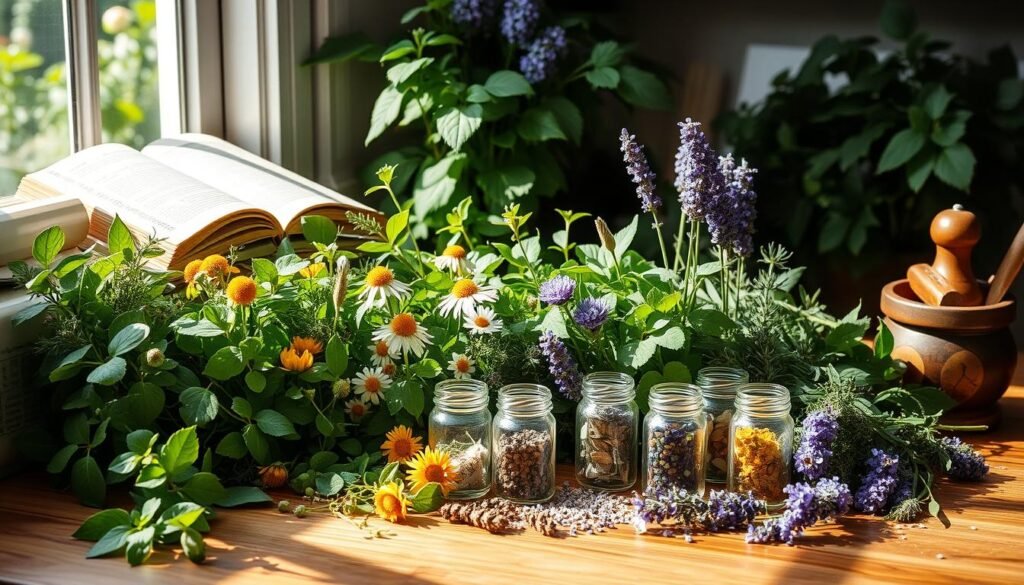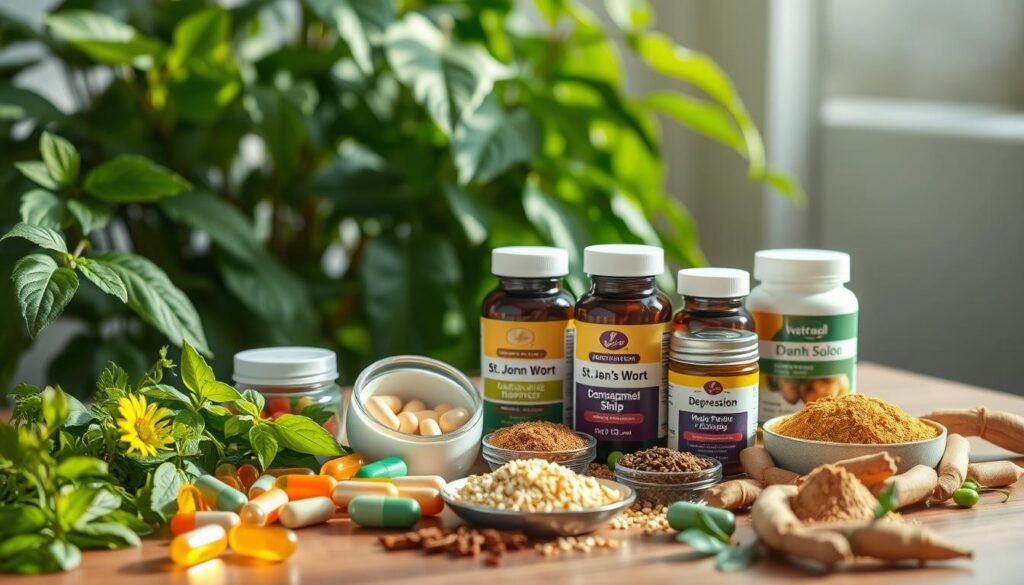In 2016, around 6.7 percent of Americans dealt with a major depressive episode. This tells us that we must find effective treatments quickly. Recognizing depression as a serious issue is the first step. More people are now looking towards natural and holistic ways to treat depression, instead of just using medications. They want to improve their mental health without dealing with drug side effects.
There are many alternative treatments out there, from herbs to mindfulness. But, it’s important to understand that not everything works for everyone. It’s key to research and talk to doctors before trying new treatments. Options like chamomile tea or omega-3 fatty acids can help. They offer different paths to feeling better that can work alongside traditional treatments.
Key Takeaways
- Depression affects approximately 6.7% of Americans, signaling a need for diverse treatment options.
- Alternative medicine for depression is gaining traction among those seeking natural remedies.
- Herbal remedies like St. John’s Wort are not FDA-approved but show promise for mild to moderate depression.
- Consultation with healthcare providers is vital for anyone considering dietary supplements or herbal treatments.
- Research continues on the efficacy of omega-3 fatty acids and other natural antidepressants.
Understanding Depression as a Mood Disorder
Depression is a serious mood disorder with symptoms that vary. These symptoms can deeply affect someone’s everyday life. People may feel sad, frustrated, or tired, and also have trouble sleeping.
It’s more common for women to be diagnosed with depression than men. The LGBTQI+ community also reports higher rates of depression. Knowing about depression helps identify risks and symptoms. This includes anxiety in kids and subtle signs in older adults.
Major depression includes feeling down or uninterested for two weeks. This greatly affects daily life. Persistent depressive disorder has milder symptoms but lasts longer. Seasonal affective disorder occurs during certain seasons but gets better with change.
With bipolar disorder, one experiences both lows and highs. Depression can be triggered by different life events in women, especially during pregnancy and menopause. Those with chronic illnesses or other mood disorders may suffer more when also dealing with depression. Getting a correct diagnosis is key to finding the right treatment.
Treatments for depression include talking therapies like cognitive behavioral therapy. Medicines such as SSRIs and SNRIs are also common, but treatments need to be customized. It’s important to see a healthcare professional if you think you’re experiencing depression symptoms.
| Type of Depression | Key Characteristics |
|---|---|
| Major Depression | Depressed mood or loss of interest for at least 2 weeks |
| Persistent Depressive Disorder | Less severe symptoms lasting for 2 or more years |
| Seasonal Affective Disorder | Symptoms occur in late fall and improve in spring |
| Depression with Psychosis | Includes delusions or hallucinations |
Exploring Alternative Medicine for Depression
Alternative medicine offers many approaches for those fighting depression. It includes things like psychotherapy and medications. Many also try things like herbal treatments, mindfulness, and yoga.
St. John’s wort is a popular herbal supplement. Studies show it may work better than a placebo. It can be as effective as other antidepressants with fewer side effects.
Dietary supplements can also help. Lack of folate has been linked to severe depression. Adding folate may decrease symptoms. Omega-3 fatty acids can also slightly reduce depression.
Mindfulness practices such as yoga can improve mental health. They help reduce stress and increase self-awareness. Yoga, in particular, may help those feeling depressed cope better. Acupuncture is another option, though its effectiveness is limited.
However, when trying these alternative treatments, be careful. They can cause side effects or react with other medicines. Always talk to a healthcare provider before starting any new treatment.

Herbal Remedies for Depression
Herbal remedies for depression are getting more popular. People are choosing natural options over regular medicine. These options often have fewer side effects.
Some herbs stand out as natural antidepressants. Let’s explore these options.
St. John’s Wort: A Popular Option
St. John’s Wort has a long history in treating depression. It’s shown promise for mild to moderate cases. The usual dose is 300 milligrams, three times a day.
But, be careful. This herb can affect other medications, possibly raising blood pressure. Always talk to a doctor before trying it.
Saffron: Emerging Research
Saffron is catching eyes as a natural antidepressant. Early studies suggest it can lift moods and fight depression. But more research is needed to prove its safety and effectiveness.
Chamomile and Lavender: Calming Effects
Chamomile and lavender are known for their calming benefits. They may improve mental health. Chamomile, for instance, has beaten placebos in easing depression.
Lavender’s scent is also promising for reducing anxiety and boosting mood. More studies are on the horizon to understand their full effects.

| Herb | Type | Potential Benefits | Concerns/Considerations |
|---|---|---|---|
| St. John’s Wort | Traditional | Effective for mild to moderate depression | Interacts with various medications |
| Saffron | Emerging | Shows promise in improving mood | Further research needed |
| Chamomile | Traditional | May relieve depressive symptoms Calming effects |
More studies required for full understanding |
| Lavender | Aromatherapy | Could help alleviate anxiety and enhance mood | More studies necessary to assess efficacy |
Dietary Supplements That May Help
Depression touches millions across the United States. It brings significant challenges such as sadness and changes in how people function. Traditional treatments include antidepressants and psychotherapy. Yet, dietary supplements also show promise in supporting mental health.
SAMe: Potential Benefits and Risks
S-adenosylmethionine (SAMe) may help with depression symptoms. It could work like standard antidepressants for some people. Yet, the FDA has not approved it for this use. Side effects and interactions with other medications need careful consideration before trying SAMe.
Omega-3 Fatty Acids: Their Role in Mental Health
Omega-3 fatty acids are found in foods like fatty fish and flaxseeds. They may be helpful for those with mood issues. While their effectiveness varies, ongoing research is looking into how they may aid mental health.
5-HTP: Supporting Serotonin Levels
5-hydroxytryptophan (5-HTP) might help increase serotonin, important for mood control. Early studies show it could improve mental well-being. But, combining it with antidepressants has safety risks. Always talk to a doctor before adding 5-HTP to your routine.

| Supplement | Potential Benefits | Precautions |
|---|---|---|
| SAMe | Mood improvement, comparable to antidepressants | Possible interactions with medications |
| Omega-3 Fatty Acids | Mood stabilization, specifically for deficiencies | Variable effectiveness across different depressions |
| 5-HTP | Supports increasing serotonin levels | Safety concerns with antidepressant combinations |
The world of supplements for mental health is vast. Everyone should carefully consider their options. Talking with healthcare providers can provide clarity and help select the right supplements.
For more information on herbs and supplements for depression, check out this resource on effective treatments.
Mindfulness Strategies for Depression
Mindfulness helps people combat depression by offering a new way to manage thoughts and emotions. Instead of getting lost in worry, it encourages living in the moment. Studies support how mindfulness can lessen anxiety and depression symptoms over the years.
It’s a whole-body approach to healing from depression. Activities like meditation and deep-breathing help bring peace and clarity. The Mindfulness-Based Stress Reduction (MBSR) program spans eight weeks. It includes group sessions, daily meditations, and a retreat guided by professionals.
Research shows mindfulness can be as effective as usual therapy methods. Mindfulness-Based Cognitive Therapy (MBCT) prevents depression from coming back. It’s especially helpful for those who have had depression multiple times. And MBCT is safe, without the side effects some therapies have.
Mindfulness tools benefit people from all walks of life, including teens and those with past trauma. They help users move past ongoing negative thoughts and stress. This can reduce the impact of anxiety, depression, and stress significantly.
Adding mindfulness to everyday life can lead to better mental health for those seeking to improve themselves. For tips on getting started, check out this detailed guide.
| Mindfulness Technique | Duration | Benefits |
|---|---|---|
| MBSR | 8 weeks, weekly 2-2.5 hour sessions | Reduces anxiety symptoms, promotes emotional well-being |
| Mindful Meditation | 10-20 minutes daily | Enhances focus, reduces stress |
| Deep-Breathing Exercises | 5-10 minutes as needed | Calms nervous system, alleviates anxiety |
Yoga for Depression: Benefits and Practices
Yoga for depression has become a key choice in mental health care. It blends physical moves, breathing, and mindfulness, offering more than stress relief.
Many facing major depressive disorder (MDD) see limited success with usual treatments. With depression as a top disability cause for adults under 45, yoga offers hope.
Yoga is a great support for those with depression. Studies show it boosts well-being and reduces depression and anxiety. Even doing yoga once a week can improve mood and lower stress.
Exercise is key for mental health, tackling anxiety and depression. Nearly 19.1% of U.S. adults battle anxiety, and yoga helps with both. It promotes overall mental health.
- Hatha Yoga is most popular in the U.S., known for its gentle moves.
- Yoga can work alone for depression or alongside other treatments.
- Many choose yoga for tackling anxiety and depression.
- Up to 7.5% of U.S. folks have tried yoga, showing its popularity.
Yoga offers a therapeutic and empowering way for those with depression. It helps build a strong self-connection, leading to better mental health.
Acupuncture: Traditional Chinese Medicine for Depression
Acupuncture is part of traditional Chinese medicine. It restores body balance by using fine needles at certain points. Many people look to it for its potential help with depression. It’s known for reducing symptoms and stress, making you feel more relaxed and well.
The National Institutes of Health (NIH) sees traditional Chinese medicine as helpful for mental health. Acupuncture is one way people with depression find relief. Other Chinese medicine practices, like qi gong and tai chi, also boost emotional health.
In traditional Chinese medicine, depression treatment is customized. It combines herbs, food, and mindfulness to heal both mind and body. Studies show Chinese herbs and acupuncture together can reduce depression symptoms. For example, the herb Kai-Xin-San has shown good results in studies.
More and more people are choosing traditional Chinese medicine for emotional health. It offers a wider view of mental health care, moving beyond just treating symptoms. This approach is more about overall well-being than conventional Western methods.
| Aspect | Traditional Chinese Medicine | Western Medicine |
|---|---|---|
| Approach | Holistic and individualized treatment | Focused on symptom management |
| Treatment Methods | Acupuncture, herbal medicine, mind-body practices | Medications, psychotherapy |
| Focus | Balancing energy and promoting overall health | Treating specific symptoms or disorders |
| Research | Continued studies on effectiveness for anxiety and depression | Extensive clinical trials for medications and therapies |
Aromatherapy for Depression: Essential Oils to Consider
Aromatherapy uses essential oils to help improve your mental health. Oils like lavender, chamomile, and bergamot are great for calming the mind. They can help ease mood disorder symptoms.
Studies show that breathing in lavender oil can help fix sleep problems. This is helpful for those whose sleep issues are tied to their depression. In 2021, research showed lavender helped people with depression sleep better. Besides, about 43% of those dealing with anxiety choose therapies like aromatherapy.
| Essential Oil | Potential Benefits |
|---|---|
| Lavender | Promotes calmness and improves sleep quality. |
| Bergamot | Reduces feelings of anxiety and stress. |
| Chamomile | Offers soothing properties and reduces emotional tension. |
| Sweet Orange | Enhances mood and fosters relaxation. |
| Sage | May help improve psychological well-being. |
| Ylang-Ylang | Can alleviate stress and enhance emotional stability. |
Even though essential oils are helpful, it’s important to use them safely. This is because the FDA does not regulate them. Talk to a doctor to use them safely. They can also make sure the oils won’t mess up your medications. Always do an allergy patch test first.
Aromatherapy can be a good additional therapy for mental health care. More research is needed to see if it can be a main treatment. But it can help improve symptoms. For many, it boosts the effects of traditional treatments for depression.
Conclusion
Looking into alternative treatments for depression could help those struggling with this wide-spread mental health issue. Herbal remedies, mindfulness, and supplements might offer hope. But, it’s crucial they are used alongside doctor-recommended treatments, not in place of them. Studies show that combining different treatments often leads to better mental health.
Keeping up with research is key to knowing how alternative therapies can help. For example, St. John’s Wort may ease mild depression. Mindfulness-based therapy might prevent depression from returning. It’s important to read up on these strategies. A large number of Australians use complementary medicines. Many think they work well. But, always talk to a healthcare provider to make sure any treatment is safe and effective.
With depression impacting over 300 million people worldwide, considering every treatment option is crucial. This includes looking at alternative treatments for depression. Merging natural and standard treatments could shape the future. It could lead to care that really fits each person’s needs.